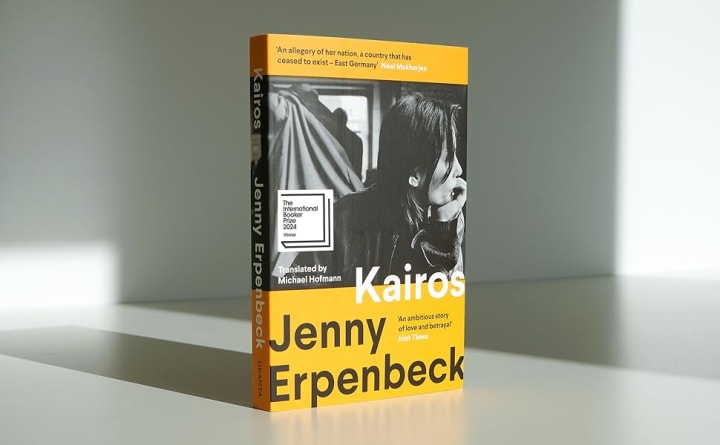Book Review: "Kairos" by Jenny Erpenbeck
5/5 - doomed and dark, Erpenbeck writes a modern classic...

This is probably a weird story of a recommendation. Last week, I was in Manchester and so, I took it upon myself to go to some of the bookshops around the area. I first went to the Waterstones in the Manchester Arndale and saw a few people carrying around the book Kairos with the intention to buy it. That seemed perfectly normal. Then I ended up at a shop called The House of Books and Friends where I saw at least two more people with or buying the book. It seemed to me that I must have been missing out on something and so, when I returned to my hometown, I went out with some friends and we each bought ourselves a copy.
Kairos is a doomed love story between a university-aged student named Katharina and a fifty-three year old man named Hans. Hans is a writer with some serious mental health issues regarding narcissism, he grew up under the Hitler Youth regime and is also married with a child. Katharina is a free-spirited girl who falls in love with this flawed and damaged man. When they meet on a bus, they fall automatically in love. Unfortunately, we already know that this is a doomed romance as not only is the age-gap questionable but the jealousy of Hans is a product of his past and his present. They are well-written characters and Hans catches Katharina in a loop in which she is never really relaxed at all.

Against the backdrop of a separated Germany, this book takes most of its place during those formative years before the fall of the Berlin Wall in which the mid to late-1980s held promise for people wishing to be free. But, the blending of lifestyles could also be seen as an analogy for the relationship in which Hans tries so desperately to craft this young girl into the image of everything he wants despite already having obligations to a wife and child.
As the relationship grows increasingly toxic and even abusive, we do not see too much of a change in Katharina and she, with all of her naive youth, keeps finding a reason to fall back in love with Hans. Hans, who insists that Katharina never see or be with anyone else, even though he himself has betrayed his wife and child to be with her. In all aspects of the book, Hans is a character that the reader loves to hate as he embodies this almost Humbert Humbert trope of being a vile, egocentric and repulsive man. But still, his character is written unapologetically and has within it, repetitions which represent those cycles of behaviour which the reader requires to identify. This is why I do not like the criticism that this book is repetitive. It almost has to be in order to show us that there is a clear pattern to Hans' behaviour that Katharina does not want to see.

The story is a frame narrative in which Hans dies at the beginning and Katharina, now living in the USA, receives word of his death. This book is not just her looking back on their relationship, but it is the reader trying to piece together how this man blatantly manipulated a young woman to his own advantage because there was basically nothing left for him to do. It is fantastic and doomed from the beginning and I think that setting it out in the frame narrative really does the story some justice because that way the reader knows that at some point, it has to end. Instead of simple narratives, this story is told in boxes that Katharina has kept relating to her time in the DDR during the 1980s.
I thought that this book was a fantastic delight of music and art encompassed in a very worrying relationship. What starts out as a Lolita type of situation in which we are aware that Hans is infatuated with her, turns very quickly into violence, manipulation, psychological abuse and so on and so forth. Bits and pieces of it feel like the film Phantom Thread in which there is a man trying to shape a woman in his image, trying to make her as he sees her fit to be. But I would argue that there is so much more psychological manipulation in this book than the Paul Thomas Anderson film.
This novel is a testament to those trying times, the changing world and the morphing of the lives of the people in it. The characters have traits that are so incredibly human that though we want to look out for Katharina as she is young, we are made to understand her predicament more than anyone else - even more than Hans.
About the Creator
Annie Kapur
200K+ Reads on Vocal.
Secondary English Teacher & Lecturer
🎓Literature & Writing (B.A)
🎓Film & Writing (M.A)
🎓Secondary English Education (PgDipEd) (QTS)
📍Birmingham, UK
X: @AnnieWithBooks
Enjoyed the story? Support the Creator.
Subscribe for free to receive all their stories in your feed. You could also pledge your support or give them a one-off tip, letting them know you appreciate their work.






Comments (1)
I saw the Berlin Wall go down as a teenager. There was hope in the air...and fear. That menace and anxiety seems to be a theme here. Excellent work!